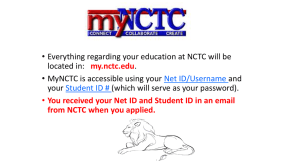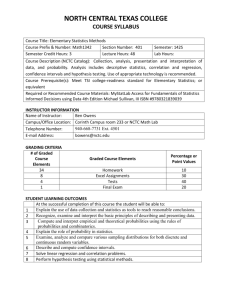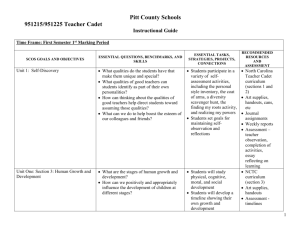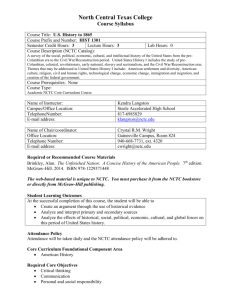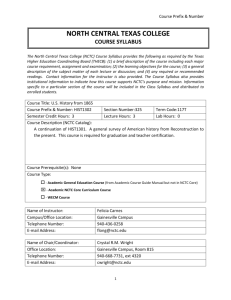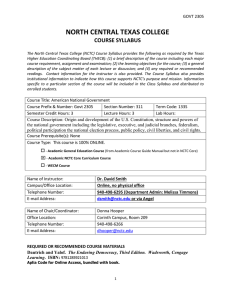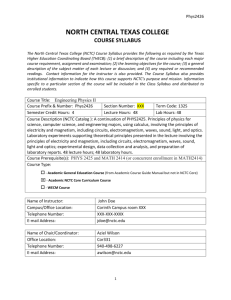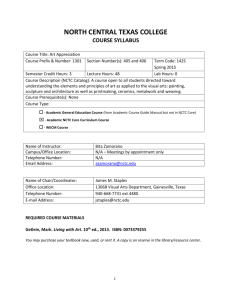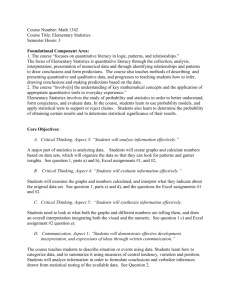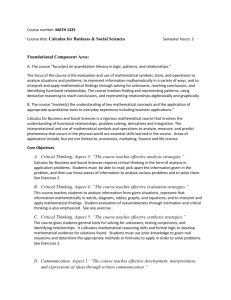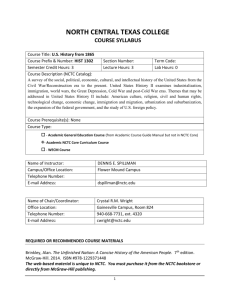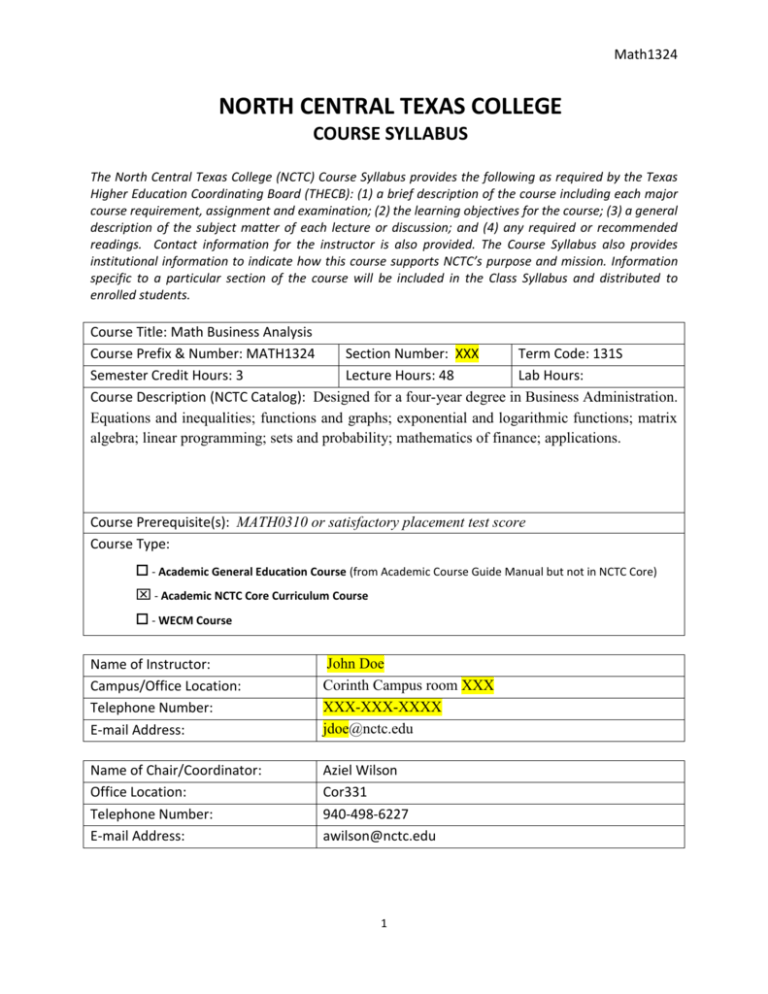
Math1324
NORTH CENTRAL TEXAS COLLEGE
COURSE SYLLABUS
The North Central Texas College (NCTC) Course Syllabus provides the following as required by the Texas
Higher Education Coordinating Board (THECB): (1) a brief description of the course including each major
course requirement, assignment and examination; (2) the learning objectives for the course; (3) a general
description of the subject matter of each lecture or discussion; and (4) any required or recommended
readings. Contact information for the instructor is also provided. The Course Syllabus also provides
institutional information to indicate how this course supports NCTC’s purpose and mission. Information
specific to a particular section of the course will be included in the Class Syllabus and distributed to
enrolled students.
Course Title: Math Business Analysis
Course Prefix & Number: MATH1324
Section Number: XXX
Term Code: 131S
Semester Credit Hours: 3
Lecture Hours: 48
Lab Hours:
Course Description (NCTC Catalog): Designed for a four-year degree in Business Administration.
Equations and inequalities; functions and graphs; exponential and logarithmic functions; matrix
algebra; linear programming; sets and probability; mathematics of finance; applications.
Course Prerequisite(s): MATH0310 or satisfactory placement test score
Course Type:
- Academic General Education Course (from Academic Course Guide Manual but not in NCTC Core)
- Academic NCTC Core Curriculum Course
- WECM Course
Name of Instructor:
Campus/Office Location:
Telephone Number:
E-mail Address:
John Doe
Corinth Campus room XXX
XXX-XXX-XXXX
jdoe@nctc.edu
Name of Chair/Coordinator:
Office Location:
Telephone Number:
E-mail Address:
Aziel Wilson
Cor331
940-498-6227
awilson@nctc.edu
1
Math1324
REQUIRED OR RECOMMENDED COURSE MATERIALS
Introductory Mathematical Analysis for Business, Economics and the Life and Social Sciences,
Ernest F. Haeussler, Jr., Richard S. Paul, and Richard J. Wood, 13th edition,
Pearson Prentice Hall, Inc., 2011 or MyMathLab access code
COURSE REQUIREMENTS, EVALUATION METHODS AND GRADING CRITERIA
# of Graded
Graded Course Elements
Course Elements
20
Homework
10
Quizzes
5
Tests
1
Final Exam
Percentage or
Points Values
XX
XX
XX
XX
ATTENDANCE POLICY
TENTATIVE TEST SCHEDULE
OTHER PERTINENT INFORMATION
INSTITUTIONAL LEARNING GOALS
A quality general education curriculum in all associate degree programs.
Quality freshman and sophomore level courses in arts and sciences which parallel the
lower division offerings of four-year colleges and universities.
Quality technical programs leading directly to careers in semi-skilled and skilled
occupations, and quality technical education programs up to two years in length leading
to certificates and associate degrees.
Quality programs and services in support of adult literacy and basic skills development
as a mean of workforce enhancement and expanding access to higher education.
PROGRAM PURPOSE STATEMENT
2
Math1324
NCTC seeks to implement its goal of offering quality general education curriculum in all
associate degrees by offering a core of general education courses designed to help students
achieve academic, career and lifelong goals. Acquiring knowledge, thinking critically, and
utilizing the methodologies of various disciplines exposed students to experiences that serve to
advance their personal growth. The chief focus of the General Education Core Curriculum at
NCTC is to emphasize Exemplary Educational Objectives and Basic Intellectual Competencies.
DEPARTMENTAL PURPOSE STATEMENT
NCTC’s Mathematics and Physics Department will teach courses that enable students to solve
abstract and concrete problems within a logical system in order to aid students in the pursuit of
their academic, professional, and civic goals.
STATEMENT OF SKILLS AND KNOWLEDGE EXPECTED OF NCTC GRADUATES
NCTC seeks to implement its goal of offering a core of general education courses designed to
help students achieve academic, career and lifelong goals. The chief focus of the General
Education Core Courses at NCTC is to emphasize basic intellectual competencies and broad
intellectual perspectives.
CORE CURRICULUM COMPONENT AREA
The overall objective of the Mathematics component area is to develop a quantitatively literate
college graduate. Every college graduate should be able to apply basic mathematical tools in
the solution of real-world problems.
MATHEMATICS: EXEMPLARY EDUCATIONAL OBJECTIVES (EEOs)
(M1) To apply arithmetic, algebraic, geometric, higher-order thinking, and statistical
method to modeling and solving real-world situations.
(M2)
To represent and evaluate basic mathematical information verbally, numerically,
graphically, and symbolically.
(M3)
To expand mathematical reasoning skills and formal logic to develop convincing
mathematical arguments.
(M4) To use appropriate technology to enhance mathematical thinking and understanding
3
Math1324
and to solve mathematical problems and judge the reasonableness of the results.
(M5) To interpret mathematical models such as formulas, graphs, tables and schematics,
and draw inferences from them.
(M6)
To recognize the limitations of mathematical and statistical models.
(M7)
To develop the view that mathematics is an evolving discipline, interrelated with
human culture, and to understand its connections to other disciplines.
STUDENT LEARNING OUTCOMES
EEO Student Learning Outcome
At the successful completion of this course the student will be able to:
M1-7 Demonstrate and apply knowledge of properties of functions, including domain and
range, operations, compositions, and inverses.
M1-7 Recognize and apply polynomial, rational, radical, exponential and logarithmic
functions and solve related equations.
M1-7 Apply graphing techniques
M1-7 Optimize objective functions using linear programming
M1-7 Recognize, solve and apply systems of linear equations using matrices.
M1-7 Identify appropriate algebraic concepts and techniques to provide mathematical models
of real-world situations and determine solutions to applied economic and business
problems.
GENERAL DESCRIPTION OF SUBJECT MATTER FOR EACH LECTURE/DISCUSSION
Topic
General Description of Subject Matter
Demonstrate and apply knowledge of properties of
Math Business Analysis
functions, including domain and range, operations,
compositions, and inverses.
Recognize and apply polynomial, rational, radical,
Math Business Analysis
exponential and logarithmic functions and solve related
equations.
Apply graphing techniques
Math Business Analysis
Optimize objective functions using linear programming
Math Business Analysis
Recognize, solve and apply systems of linear equations
Math Business Analysis
using matrices.
Identify appropriate algebraic concepts and techniques to
Math Business Analysis
provide mathematical models of real-world situations and
determine solutions to applied economic and business
problems.
BASIC INTELLECTUAL COMPETENCIES FOR THIS COURSE
4
Math1324
READING – Reading at the college level means the ability to analyze and interpret a variety
of printed materials – books, articles and documents. A core curriculum should offer
students the opportunity to master both general methods of analyzing printed materials
and specific methods for analyzing the subject matter of individual disciplines.
WRITING – Competency in writing is the ability to produce clear, correct, and coherent
prose adapted to purpose, occasion, and audience. Although correct grammar, spelling,
and punctuation are each a sine qua non in any composition, they do not automatically
ensure that the composition itself makes sense or that the writer has much of anything to
say. Students need to be familiar with the writing process including how to discover a topic
and how to develop and organize it, how to phrase it effectively for their audience. These
abilities can be acquired only through practice and reflection.
SPEAKING – Competence in speaking is the ability to communicate orally in clear, coherent,
and persuasive language appropriate to purpose, occasion, and audience. Developing this
competency includes acquiring poise and developing control of the language through
experience in making presentations to small groups, to large groups, and through the
media.
LISTENING – Listening at the college level means the ability to analyze and interpret various
forms of spoken communication.
CRITICAL THINKING – Critical thinking embraces methods for applying both qualitative and
quantitative skills analytically and creatively to subject matter in order to evaluate
arguments and to construct alternative strategies. Problem solving is one of the
applications of critical thinking, used to address an identified task.
COMPUTER LITERACY – Computer literacy at the college level means the ability to use
computer-based technology in communicating, solving problems, and acquiring
information. Core-educated students should have an understanding of the limits, problems,
and possibilities associated with the use of technology, and should have the tools necessary
to evaluate and learn new technologies as they become available.
Last day to Withdraw For the Fall 2013 semester, the last day to withdraw from a course with
a “W” is November 16, 2013.
Student Rights &
NCTC Board policy FLB (Local) Student Rights and Responsibilities states
Responsibilities
that each student shall be charged with notice and knowledge of the
contents and provisions of the rules and regulations concerning student
conduct. These rules and regulations are published in the Student
Handbook published in conjunction with the College Catalog. All
students shall obey the law, show respect for properly constituted
authority, and observe correct standards of conduct.
5
Math1324
Scholastic Integrity
Scholastic dishonesty shall constitute a violation of college rules and
regulations and is punishable as prescribed by Board policies.
Scholastic dishonesty shall include, but not be limited to cheating on a
test, plagiarism, and collusion.
STUDENT SUPPORT SERVICES
Disability
Accommodations
The Office for Students with Disabilities (OSD) provides
accommodations for students who have a documented disability. A
disability is anything that can interfere with learning, such as a learning
disability, psychological challenge, physical illness or injury.
Accommodations may include extra time on tests, tests in a distraction
reduced environment, volunteer note taker in class, etc.
On the Corinth Campus, go to room 170 or call 940-498-6207. On the
Gainesville Campus, go to room 110 in the Administration (100) Building
or call 940-668-4209. Students on the Bowie, Graham, Flower Mound,
and online campuses should call 940-668-4209 to arrange for an intake
appointment with OSD.
North Central Texas College is on record as being committed to both the
spirit and letter of federal equal opportunity legislation, including the
Americans with Disabilities Act (ADA) of 1990, ADA Amendments Act of
2009, and Section 504 of the Rehabilitation Act of 1973 (P.L. 93-112).
Student Success
Center
The Student Success Center is designed to help all students at NCTC
develop tools to achieve their academic goals. The center links students
to FREE tutoring, including a Writing Center, a Math Lab, and free online
tutoring in the evening. The program helps students acclimate to
college by providing students free interactive workshops about Time
Management, Study Skills, Test Anxiety, and much more. For more
information, please visit your nearest Student Success Center.
Financial Aid,
Scholarships, and
Veterans Services
The Financial Aid Office is responsible for administering a variety of
programs for students who need assistance in financing their education.
The first step for financial aid is to complete a FAFSA. For more
information, please visit your nearest Financial Aid Office.
Tobacco-Free
Campus
NCTC restricts the use of all tobacco products including cigarettes,
cigars, pipes and smokeless tobacco on campus property. NCTC is aware
6
Math1324
that tobacco use influences underage students which cumulates
unsightly tobacco litter and interferes with assuring clean air for all who
come to NCTC. NCTC recognizes the health hazards of tobacco use and
of exposure to second hand smoke. Information on a tobacco cessation
program is available for students, faculty, staff who wish to stop using
tobacco products. We would like to "thank you" for your help in making
our campuses Tobacco-Free. For questions or concerns please contact
the Office of Vice President of Student Services at 940.668.4240.
7

